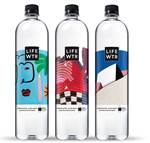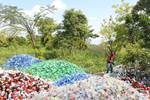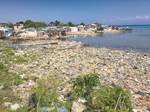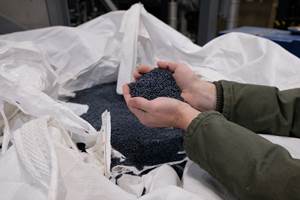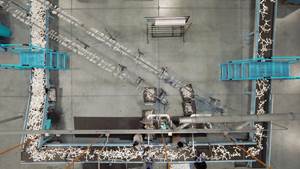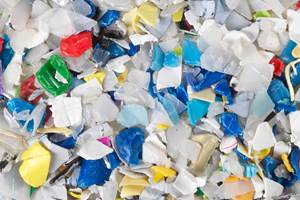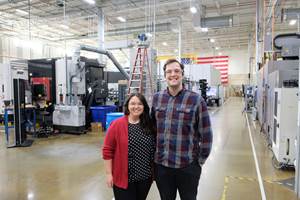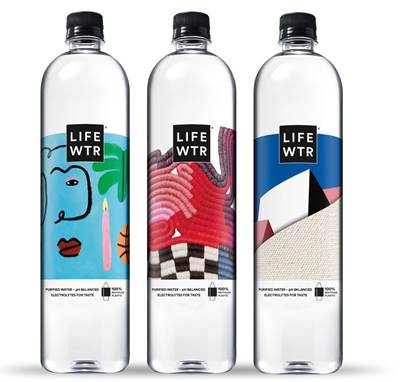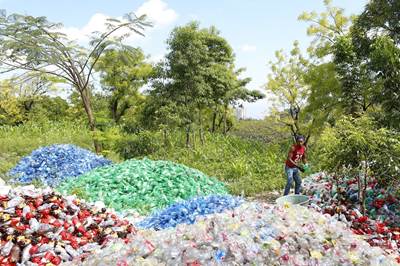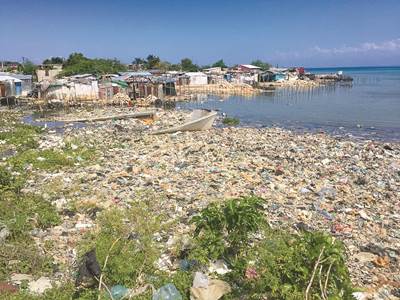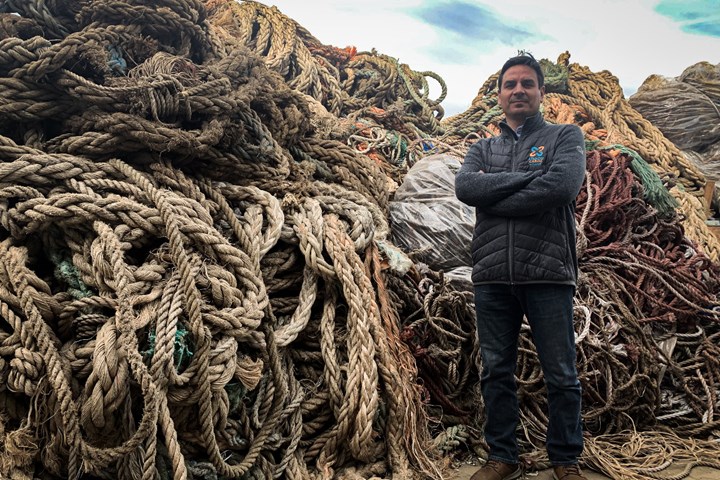
Francisco Cruz, co-founder and CEO of Atando Cabos, in front of discarded fishing gear that will be recycled into new products.
Discarded plastic fishing ropes were contaminating the delicate ecosystem of Patagonia region of Chile. But instead of seeing these ropes as simply hopeless waste, a circular economy model was implemented that has created social, environmental and economic impact.
Francisco Cruz is co-founder and CEO of Atando Cabos, a company focused on ending the contamination of discarded fishing and marine farming gear from the coasts of Patagonia.
In partnership with Comberplast, a custom injection molder manufacturer in Chile, and Recollect, a provider of waste management for the fishing industry in the southern part of Chile, Atando Cabos collects plastic waste that ends up all over the Austral coast, to transform them again into raw material and reincorporate them into the production chain as long-term recyclable products.
Cruz says that Comberplast has used recycled plastic for several years in all kinds of products from housewares to containers and pallets for the logistics industry.
“We were wanting to find new sources of discarded plastics. It always must be price competitive products and high-quality—that’s the basis of what we do,” he said. “But we also wanted to see if we could start telling the story of where the material came from. Ocean plastics started to become really attractive.”
The idea to turn ocean-bound plastics into new recycled materials continues to gain steam in the recycling industry. Cruz and his team was then introduced to the concept of turning discarded ropes into new material.
“We saw an interesting opportunity to obtain a big supply of material,” he said. “It had some complications in the beginning, but it’s a good, quality material and also solving a real problem in this place of world.”
They realize that this was much more than just a good initiative and there needed to be an independent company so Atando Cabos was born. It also required strong partnerships in manufacturing.
Partnerships
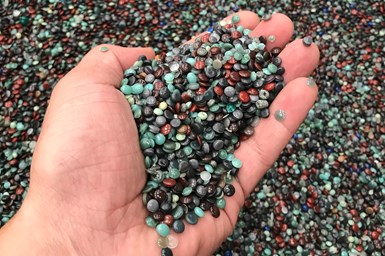
The ocean-bound recycled pellets.
Atando Cabos began with the aim of collecting the ropes and recycling them into new products. But the ropes were made of two incompatible materials that wouldn’t mix and couldn’t be separated. Cruz said they collaborated with ExxonMobil to design a solution.
By using ExxonMobil’s Vistamaxx performance polymers, Atando Cabos was able to compatibilize PE and PP, turn the discarded ropes into high-quality end products and begin the project.
Since the launch in 2018, more than 2,000 tons of rope have been recycled. The goal is to eventually recycle 2,000 ropes per year.
Engel machinery is used at Comberplast to manufacture the end products, which to start off with are high impact resistant crates. Other potential applications include housewares, water harvesting systems, chairs and more.
“Engel feels strongly about sustainability and works closely with like-minded companies like Atando Cabos and ExxonMobil on various projects throughout the manufacturing and recycling process,” said Mark Sankovitch, CEO of Engel Machinery, in a statement. “We continue to look for partnerships and developments concerning the circular economy. Engel believes that international and interdisciplinary interaction are essential to close the material cycle using collaboration along the entire value chain.”
Cruz said that since Comberplast has worked with recycled material for some time, they didn’t have to make any changes to the machinery used to process this new material.
What’s Next
Atando Cabos is also focused on developing traceability to keep track of the origin of the material and provide this information to the end-users.
“The conversations now are really centered on the origin of the material and the purpose,” Cruz said. “They know the material has to work and makes a good product. But it’s also about the story to help them boost their own business. We are building all the tools necessary, including reporting traceability and that type of information.”
Cruz said the company is having good results with big companies in the U.S., and would like to expand more into the market.
“We know there is a lot of trust issues with the recycling industry and trust in every sense—from quality of material to the truth of the story—and what we are building are all the necessary tools for our customers and suppliers to have that trust,” he said.
Related Content
New Facility Refreshes Post-Consumer PP by Washing Out Additives, Contaminants
PureCycle prepares to scale up its novel solvent recycling approach as new facility nears completion.
Read MoreReversing Logistics for Plastic Film Recycling
Learn how Mainetti built a circular supply chain for clear film packaging.
Read MoreLooking to Run PCR on a Single Screw? Here’s What to Keep in Mind
Just drop it in and mix it up? Sorry, there’s a lot more to it than that. Here is some of what you need to consider.
Read MoreScaling Up Sustainable Solutions for Fiber Reinforced Composite Materials
Oak Ridge National Laboratory's Sustainable Manufacturing Technologies Group helps industrial partners tackle the sustainability challenges presented by fiber-reinforced composite materials.
Read MoreRead Next
Leading the Charge: Brand Owners Moving to Boost Recycled Content in Packages, Products
Leading brand owners and a big-box retailer discuss their recycling goals, which will impact processors and the entire supply chain.
Read MoreHP Expands Ocean Plastics Program
New washing line in Haiti helps reduce ocean-bound plastic.
Read MoreTrash as Value: Turning Ocean Waste Into Viable Products
So-called “ocean plastics” is a global problem, but a wide range of companies across the entire supply chain have put in the time, money and R&D efforts necessary to make capturing and converting the material into a sustainable business. But demand must follow.
Read More


